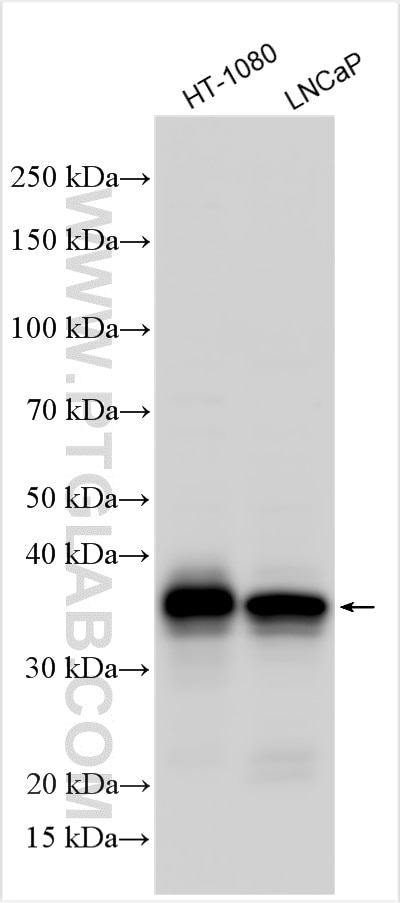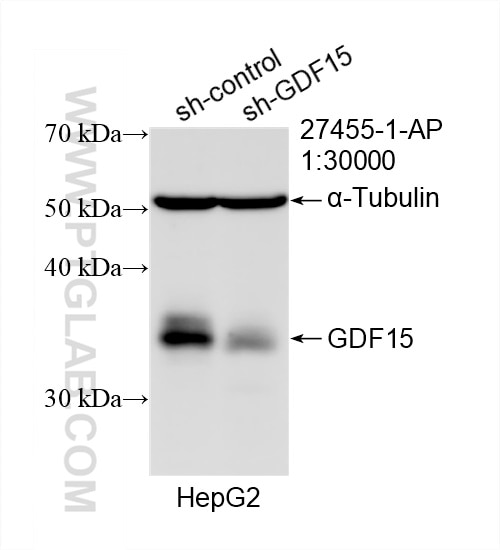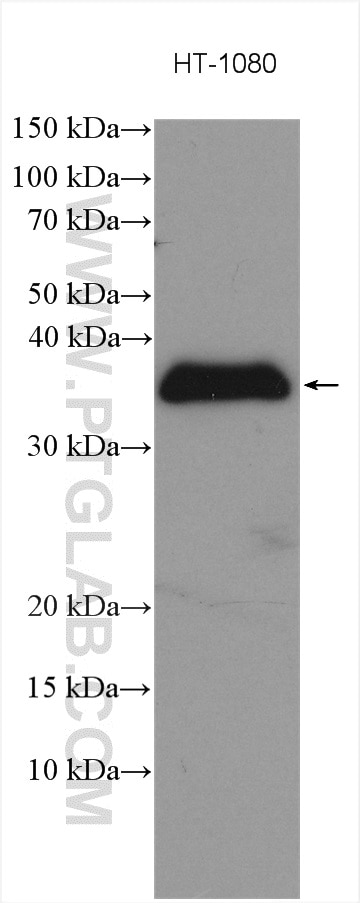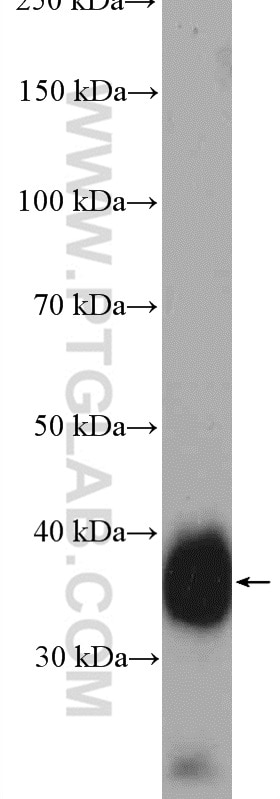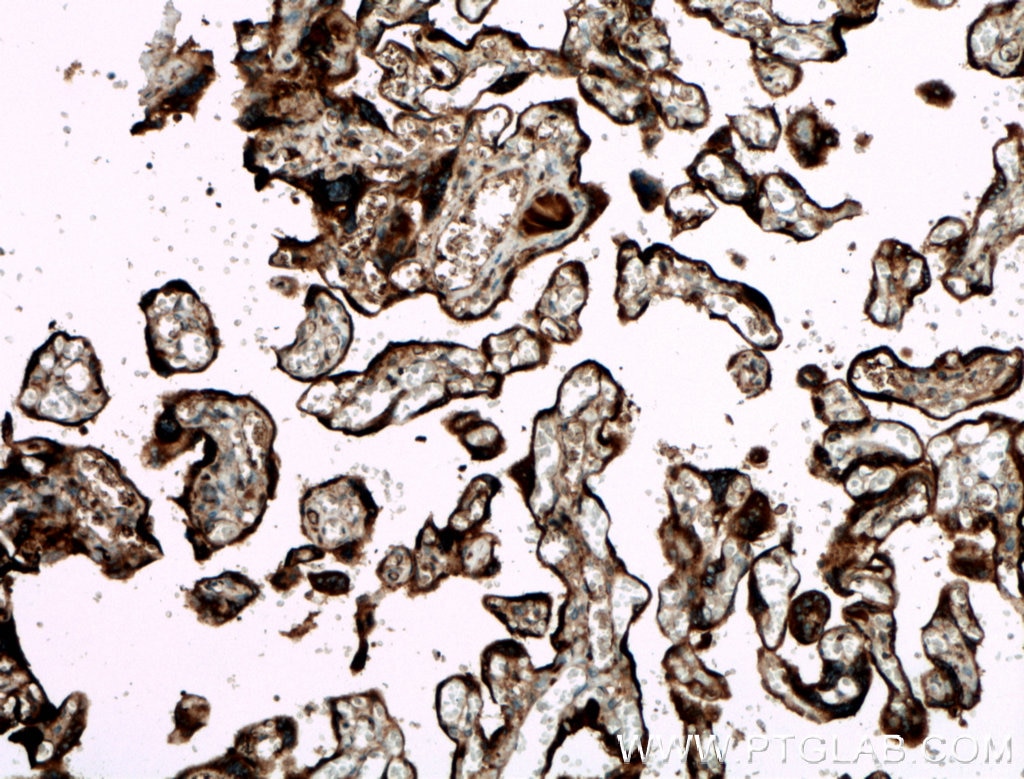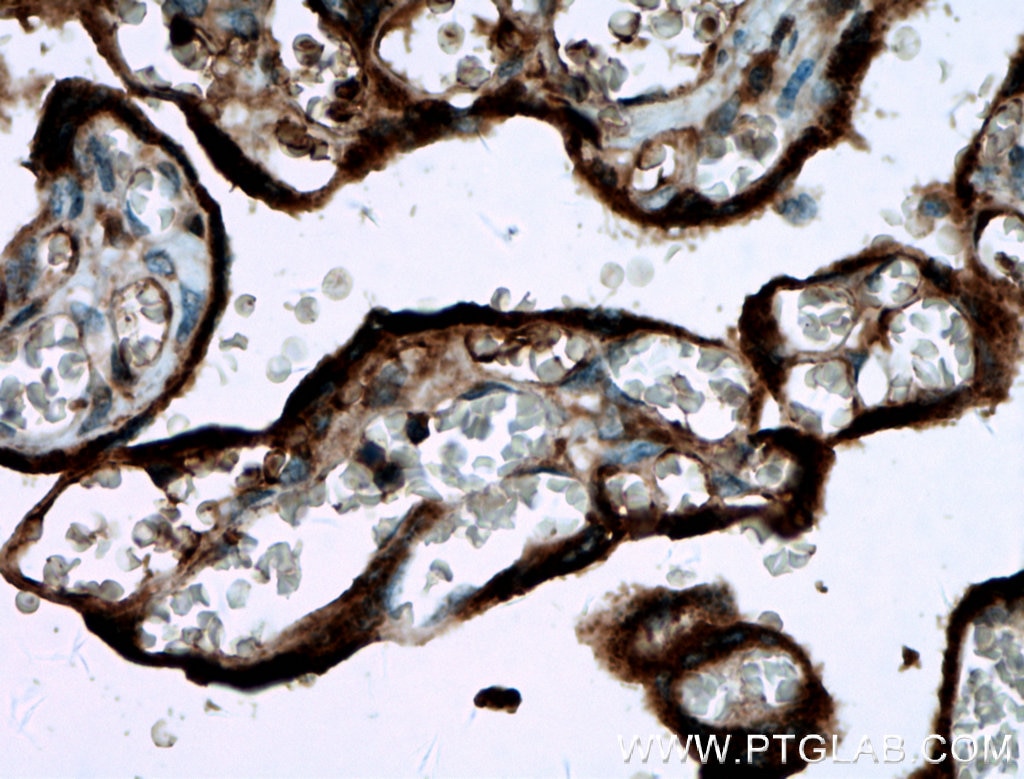- Featured Product
- KD/KO Validated
GDF-15 Polyclonal antibody
GDF-15 Polyclonal Antibody for WB, IHC, ELISA
Host / Isotype
Rabbit / IgG
Reactivity
human and More (2)
Applications
WB, IHC, IF, ELISA
Conjugate
Unconjugated
Cat no : 27455-1-AP
Synonyms
Validation Data Gallery
Tested Applications
| Positive WB detected in | HT-1080 cells, HepG2 cells, human placenta tissue, LNCaP cells |
| Positive IHC detected in | human placenta tissue Note: suggested antigen retrieval with TE buffer pH 9.0; (*) Alternatively, antigen retrieval may be performed with citrate buffer pH 6.0 |
Recommended dilution
| Application | Dilution |
|---|---|
| Western Blot (WB) | WB : 1:2000-1:10000 |
| Immunohistochemistry (IHC) | IHC : 1:50-1:500 |
| It is recommended that this reagent should be titrated in each testing system to obtain optimal results. | |
| Sample-dependent, Check data in validation data gallery. | |
Published Applications
| KD/KO | See 13 publications below |
| WB | See 30 publications below |
| IHC | See 7 publications below |
| IF | See 3 publications below |
Product Information
27455-1-AP targets GDF-15 in WB, IHC, IF, ELISA applications and shows reactivity with human samples.
| Tested Reactivity | human |
| Cited Reactivity | human, mouse, rat |
| Host / Isotype | Rabbit / IgG |
| Class | Polyclonal |
| Type | Antibody |
| Immunogen | GDF-15 fusion protein Ag26760 相同性解析による交差性が予測される生物種 |
| Full Name | growth differentiation factor 15 |
| Calculated molecular weight | 34 kDa |
| Observed molecular weight | 34 kDa |
| GenBank accession number | BC008962 |
| Gene symbol | GDF15 |
| Gene ID (NCBI) | 9518 |
| RRID | AB_2880875 |
| Conjugate | Unconjugated |
| Form | Liquid |
| Purification Method | Antigen affinity purification |
| Storage Buffer | PBS with 0.02% sodium azide and 50% glycerol pH 7.3. |
| Storage Conditions | Store at -20°C. Stable for one year after shipment. Aliquoting is unnecessary for -20oC storage. |
Background Information
Growth differentiation factor 15 (GDF15), also known as macrophage inhibitory cytokine-1 (MIC-1), is a protein of the transforming growth factor beta (TGFb) superfamily that regulates inflammatory and apoptotic pathways in injured tissues and during disease processes. GDF15 is a stress-induced cytokine and associated with hypoxia, inflammation and oxidative stress, it is also released from endothelial cells after stimulation with pro-inflammatory cytokines. GDF15 has been suggested as a target and biomarker for cardiovascular disease as it plays a cardioprotective role in the adult heart. GDF15 is highly expressed in the placenta. GDF15 is known to be involved in human embryo development and necessary for the maintenance of pregnancy. GDF15 is also produced by adipocytes in response to oxidative stress, a well-known factor associated with preeclampsia.
Protocols
| Product Specific Protocols | |
|---|---|
| WB protocol for GDF-15 antibody 27455-1-AP | Download protocol |
| IHC protocol for GDF-15 antibody 27455-1-AP | Download protocol |
| Standard Protocols | |
|---|---|
| Click here to view our Standard Protocols |
Publications
| Species | Application | Title |
|---|---|---|
Gastroenterology Hepatic Stellate Cells in Hepatocellular Carcinoma Promote Tumor Growth Via Growth Differentiation Factor 15 Production.
| ||
Nat Commun Dual functions of SPOP and ERG dictate androgen therapy responses in prostate cancer. | ||
Cancer Lett SULF2 enhances GDF15-SMAD axis to facilitate the initiation and progression of pancreatic cancer. | ||
Oxid Med Cell Longev Cyclic Polypeptide D7 Protects Bone Marrow Mesenchymal Cells and Promotes Chondrogenesis during Osteonecrosis of the Femoral Head via Growth Differentiation Factor 15-Mediated Redox Signaling. | ||
Cancers (Basel) GDF15 Is an Eribulin Response Biomarker also Required for Survival of DTP Breast Cancer Cells.
| ||
Mol Neurobiol Exosomes Derived from Meningitic Escherichia coli-Infected Brain Microvascular Endothelial Cells Facilitate Astrocyte Activation |
